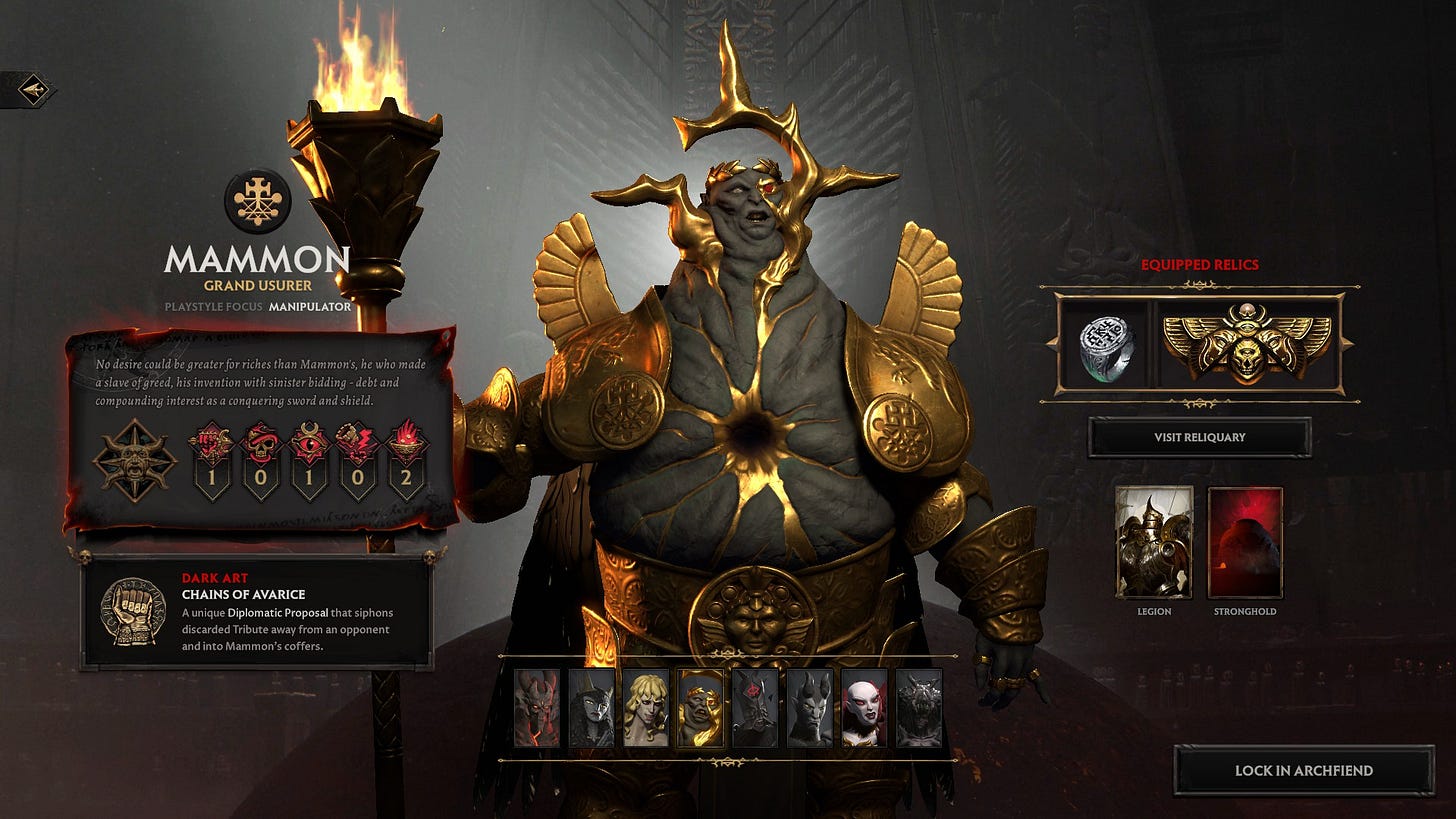Last episode, I mentioned Armello as a great example of a digital boardgame. And I wasn’t kidding — it’s truly best in class and loved by players all over the world.
However, Armello’s creators, League of Geeks, didn’t stop making games. Instead, they took what they learned from Armello and applied it to something surprising — a remaster of a nearly forgotten niche PC strategy game, Solium Infernum.
The effort of one man, Vic Davis, Solium held the credit of being Distinctly Weird but also Strangely Compelling. Its turn structure, its theme, and its general player-driven drama (as opposed to the mechanics-y interactions of a game like Civilization) made it feel much more like the modern iterations of the aforementioned “digital boardgames” than its 4X peers at the time.
Solium Infernum was only available directly through Vic’s site (foregoing Steam — this was pre-Greenlight/EA/etc.), which meant that, when his site went down a number of years ago, so too did access to Solium, the game fading into the annals of history.
Until…
Woooh buddy! We got ourselves a glow up on our hands!
League of Geeks took their expertise, honed from working on Armello, and applied it to a harder and more demanding assignment — remaster an ahead-of-its-time esoteric niche strategy game and make it appealing to a wide audience — and absolutely knocked it out of the park.
Solium is a gamer’s game, and LoG’s version even more so. It’s got a depth of strategy and tactics that reveal themselves only over hours of play, through wheels within wheels of schemes and tactics, feints and double-crossed deals.
To make all this work is not only a hard task, but something that is typically reserved for teams 10x the size of League of Geeks. That they were able to produce such a cogent, confident, and frankly wildly ambitious strategy game that is able to absolutely sing at all turns is astounding.
Which makes me more all the more grateful I was able to sit down with two major forces of the project, William Dyce and Peter “Macky” McIntosh, and talk about how you even go about approaching something like this (from a Game Data angle). Nobody sits down and tries to build Civilization from scratch. Nobody except League of Geeks, it seems.
Even more unprecedented was that the path they chose wasn’t the one of least resistance. Instead, they deliberately chose a way of doing things that required a steeper-than-average upfront cost, but was ultimately a technical investment that allowed them to be able to do the game at all.
In talking with Will and Peter, I came away absolutely floored at the technical feats they had accomplished with Solium, seeming to have actually done The Things I think many people envision for making this type of game, but rarely have the resources or necessary political sway to make it happen.
The game itself also shines in this regard — not only is it incredibly fun to play, but it just feels solid in a way that is hard to describe. Every action feels definitive, but the game’s ability to flex with you as a player (rolling back actions, working with niche scenarios, etc.) speaks to an underlying system and technical team that is in absolute control of their tools.
Which is also makes it more bittersweet that, mid last year, League of Geeks trimmed its workforce largely to just the three original founders, unable to secure funding for their also incredible looking game Jumplight Odyssey and Solium not being a big enough hit to float the studio.
Solium is a swan song then, not unlike Mimimi’s Shadow Gambit: The Cursed Crew — the (potentially) final game from a developer operating at the peak of its ability, firing on all cylinders to deliver above and beyond what a player expects and making a mark on the genre in the process.
So now enjoy my conversation with Will and Peter as we dive into Hell and see off Solium into the sunset, and long live League of Geek’s legacy of making great strategy games.












